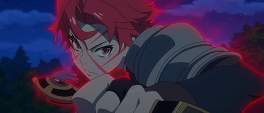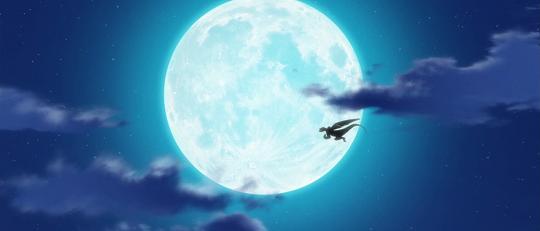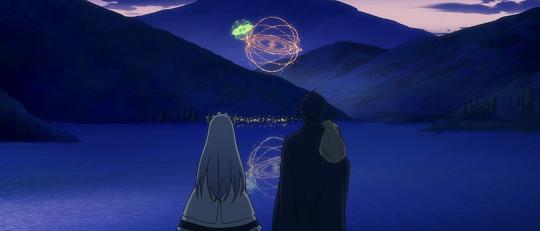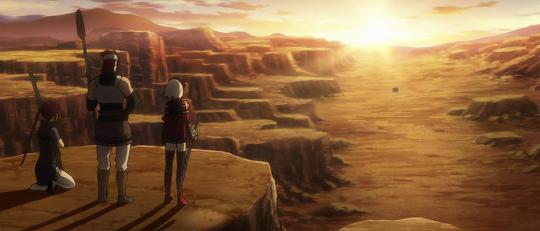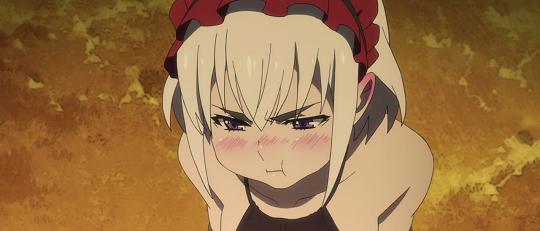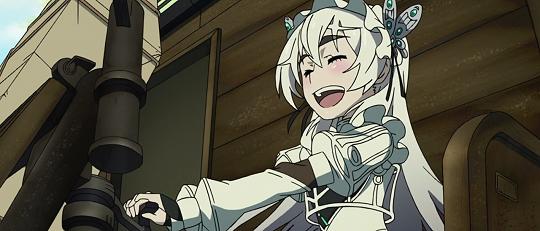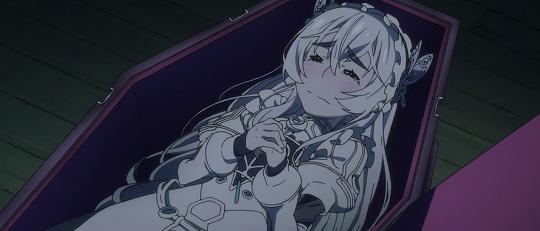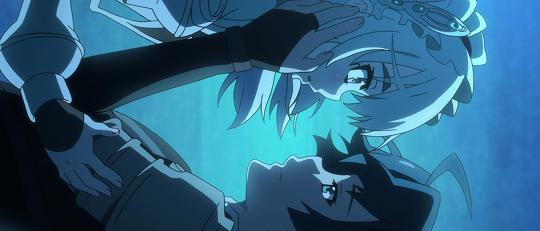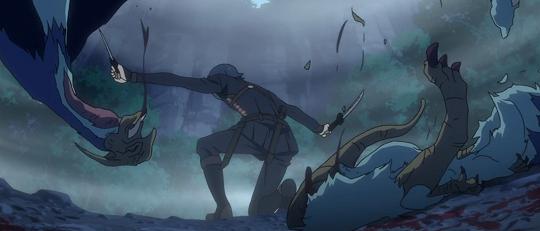There aren’t many ways of describing Hitsugi no Chaika (Chaika the Coffin Princess) that don’t boil down to it being “solid”. It starts pleasingly enough pitching a late medieval fantasy world where unicorns aren’t brushed snow stallions but grotesque slathering monsters, then proceeds to flesh out its trio, then quartet, of main characters before concluding with a satisfying end. A second season (or continuation of this season depending on your point of view of staggered broadcasts) has been announced which is unsurprising given that the series has been well received and has enough mileage in its premise to carry it through another dozen or so episodes.
The titular Chaika is an amnesiac goth loli with apple cheeks and a clipped, almost breathless cadence to her speech who is looking for the remains of her father, Emperor Gaz. Enlisting the help of the mercenaries, or “saboteurs” in the series’ lingo, Toru and Akari, the group set off to help Chaika in putting her father to rest. The issue being of course that Gaz was killed because of the war he started that lasted two hundred years, and his remains were separated so that his immense magical powers would not allow him to reform, T-1000 style, and start up hostilities all over again. Nothing is ever easy.
Chaika alone is worth watching the series for because apart from her unusual pattern of speech, she has a kind of pragmatic naivete that when put next to the jaded and cynical Toru and Akari creates a wonderful dynamic between the three. Thankfully Chaika’s character isn’t just used for comic relief and her fight against the realisation of both what she supposedly is - daughter of a megalomaniacal despot - and what the evidence proves she is - super sentai Chaika squad unite! - lets her be light-hearted as well as sympathetic.
The story itself conspires against Chaika and co ever learning too much at once about her father or her genesis with a convenient though contextually appropriate amnesia stopping her from remembering her past and different groups having different snippets of information on the now deposed tyrant. It creates a believable aura of misinformation and confusion but with the knowledge that something isn’t quite right with everyone’s story. It’s a theme that’s carried through to the individual stories with deception and duplicity at the heart of many of them; whether that’s a hero that has fallen on hard times or a thief masquerading as a princess. In short, the drip feed of information about the larger plot is measured just enough not to overload or infuriate, and never overbears any ongoing peril.
Make no mistake then, even though Chaika and eventually Fredrika - a dragoon with an almost childlike zeal when it comes to pugilism - provide a lot of the lighter moments, the series as a whole isn’t afraid to show its claws. Murder, vivisection and mind control are all present but this isn’t the grim dark-ages of something like Berserk, but a level of circumstantial brutality is expected; this isn’t a lutes and elves fantasy land and Akari isn’t above just clocking a hubristic wizard in the head with a hammer to get things done.
It is somewhat odd to see a female protagonist with a hammer as her main weapon but is demonstrative of how different the series’ fantasy world is. The particular brand of magic used here is expressed through the “gundo” which is the long-barreled rifle that is taller than Chaika, but is used from everything to creating mist to cooking food (with varying results for both). The fuel for these gundo will obviously have a bearing on Chaika’s murky past and her amnesia but it’s integrated into the story in the same way that Full Metal Alchemist’s alchemy is - with sacrifice comes power. Akari may use a hammer, Chaika a rifle and Toru daggers, but it’s Gillette, a blonde and noble cavalier who provides the first instance of conflict with Chaika. It’s his story, along with his troops under the banner of the Kleeman organisation, that provide a lot of the context for the world that Chaika and her group are occupying.
It makes sense that the adventurous road trip they are on wouldn’t be concerned with peasant uprisings or military jingoism or the plight of the poor. Even though we never get a map of the world as a whole (at least not without indecipherable moon runes on it), it is Gillette’s story that fleshes out what kind of society has been left in the wake of two hundred years of war. You could argue that his dealings could be omitted without adversely affecting Chaika’s story, which would be technically correct but crucially Gillette provides a counterpoint to the cold, almost businesslike temperament of the saboteur duo and a conflicting account of Emperor Gaz’s demise and Chaika’s existence. Suffice it to say, it’s easy to see that both stories are feeding into the grander narrative of why Chaika exists at all.
I criticised Dragonar for introducing story elements that aren’t concluded so it may seem odd not to level the same criticism here. When this series’ twelve episodes are done we don’t know why Chaika is on her quest or how this little girl is able to heft such an enormous coffin around without issue. Here though, there is a cohesive and planned story being told with an obvious conclusion that doesn’t boil down to “ta-da, she’s a cyborg!” (although the magic / technology mix might just…); Dragonar felt a lot like someone ticking off boxes rather than constructing a convincing story around them. The argument against Dragonar is helped by the fact that it wallows in its hyper-sexualised cast, a “feature” that is entirely absent in Chaika: not one of the females or even the males are objectified or otherwise inappropriately disrobed.
Instead of spending time on the curves of the females in the cast then, studio Bones has spent time honing the Tron-like glow of the mandalas when magic or used, or maintaining a typically utilitarian approach to the animation: no episode particularly stands out for lack of polish but similarly there are no opulent sequences of animator destroying action. Hitsugi no Chaika then is a solid, entertaining series by any measure. Its protagonist is endearing and empathetic and bolstered by a group whose chemistry together works regardless of the situation. Just as satisfying without the promise of a second season, but if it can maintain or improve upon the structure of this first series, then it will be something very special indeed.

